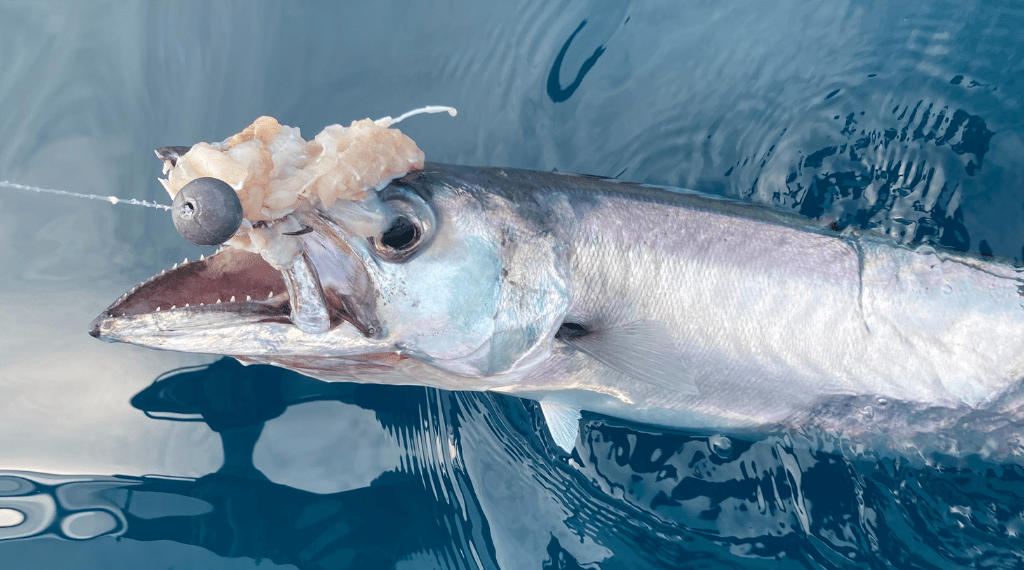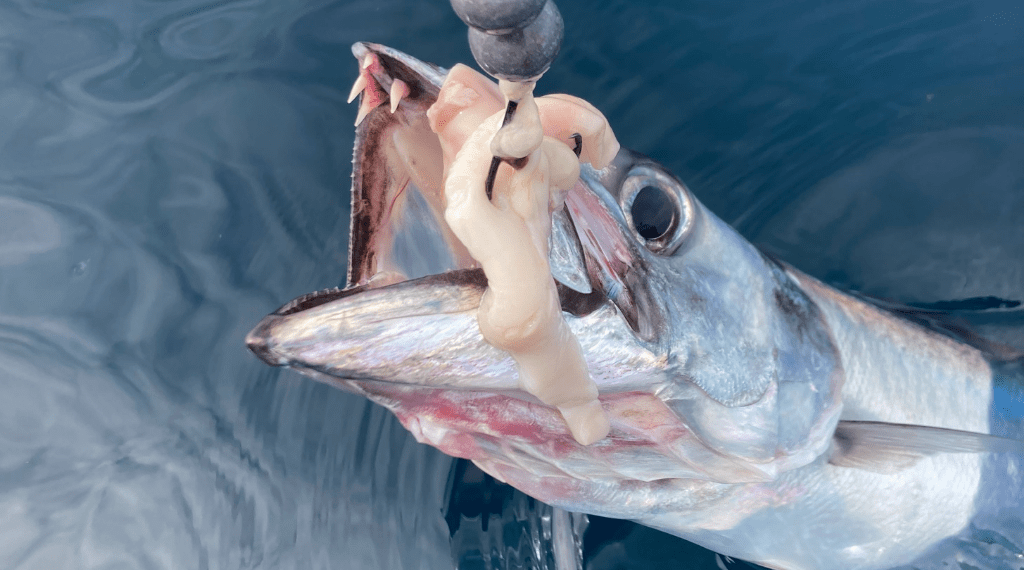Barracuda is a menacing and intimidating species. They are aggressive and put up a good fight when they’re caught. So they are certainly a fun fish to catch. But can you eat Barracuda?
Yes, you can eat barracuda but you need to be careful.
If you choose to eat barracuda there are several things you should be aware of.
Find out what in this article.
What Is a Barracuda?
There are species of barracuda found in warm ocean waters all around the world. It is an aggressive predatory fish that can grow to be quite large. There have been barracuda that have been measured up to nearly 5 feet long and weigh 100 pounds.
They are scavengers and tend to prey on smaller fish or the remnants left behind after a larger predator makes a kill.

When swimming, they can reach nearly 30 miles per hour, making it fairly easy for them to overtake prey. Their long, slender bodies make it hard for them to be seen. The two dorsal fins make them able to seemingly rocket in like a torpedo from out of nowhere. They are very good at spotting the movement of their prey from a long distance. They swoop in and bite them in half before they can get away.
Younger barracuda will stay together in small groups. They will swim in formation to move a school of fish to a shallow area to feed on them more easily.
As they get older, barracudas are solo animals. This could be because they don’t want to compete with the others for food. They will, however, fight over food with other sea creatures, such as mackerel, mullet, and small tuna. A barracuda can be a fierce competitor, and its speed often ensures it’s a victor.
Can You Eat Barracuda?
Barracuda has been placed at the top of the list of predatory fish that should be avoided by the Centers for Disease Control. The reason for this is ciguatera fish poisoning.
Ciguatoxin is an organism that is plentiful in the algae that grow along the reefs of tropical waters. This algae is a major food source for many types of fish, including tuna and anchovies. These fish can process the toxin and so it does not affect them. A barracuda, however, will accumulate it in their flesh over time. This will lead to a bad experience for anyone who eats a tainted fish.
The odds of this happening are low. Only a few people have reported being affected by ciguatoxin. Common symptoms include:
- Nausea
- Vomiting
- Muscle pain
- Digestive issues
- Dizziness/vertigo
Since there is no way to know if a barracuda is infected, it is understandable why there is so much caution surrounding the consumption of this fish. This is why many people ask the question can you eat barracuda.
But, while many experts say barracuda should not be on the menu at your next barbecue, there are cultures around the world that consider it to be a delicacy.
Can You Eat Barracuda Without Getting Sick?
Barracuda grow to be quite large. When deciding which one to prepare and serve, the rule is that smaller is better.
Larger specimens have consumed more fish, so they have been exposed to more ciguatoxin. That means that the possibility of its flesh being infected is greater. A lot of people will tell you to only consider eating baby barracuda. Not only are they less likely to carry toxins but they are also the most flavorful. Most agree that you should only consume barracudas that are 3.5 feet long or less.
The larger fish also risk carrying a lot of mercury in their bodies. While having a meal of it now and again is unlikely to be dangerous, it can become so if it were to be a regular dinner option. Mercury can poison the body and lead to death if too much is consumed. The smaller ones are far less likely to have an unhealthy amount of mercury.
Another way to avoid getting tainted meat is to steer clear of eating anything containing the head or the internal organs. If you are preparing it yourself, be sure to rinse the flesh very well before preparing it.
What Does Barracuda Taste Like?
When a cooked barracuda filet is placed in front of you, the first thing you will notice is that the meat is darker than what you would find with cod or haddock.
There is increased blood flow throughout the fish’s body because it is so fast and strong. It has a strong flavor, much more so than a typical white fish that would commonly be served in a restaurant – but not as strong as anchovies. The meat is lean and not very oily. Because of this, it is considered to be a healthier option when broiled or stewed.
How Should I Consume Barracuda?
While it’s true that a barracuda is an intimidating fish when seen in the ocean, it becomes something else when seen on a plate. It is very flavorful, though it may not be for everyone. The fact that it can hold up to so many different ways of preparation makes it extremely attractive to people wanting to try something different.

As with any fish, there are several ways to prepare barracuda. The most common way is to cut filets from the fish and prepare them with oil or butter. It can be steamed or broiled for a healthy, protein-rich entree. Served with vegetables or pasta, it is quite popular in many parts of the world.
In the Caribbean, restaurants serve barracuda in a stew. The base of tomato or vegetable soup is made and then the fish filets are added and cooked until the meat crumbles. The stew is often heavily seasoned to cover some of the strong flavors and aromas of the fish. It can be made quite spicy with scotch bonnets or habanero peppers added.
Barracuda is also a good candidate for frying. Even though the meat is very lean, it does a good job of holding together while being cooked. It can be battered and placed in a pot of hot oil or dropped into a deep fryer until the outside becomes crispy and gold. It is delicious when served with a side of fries.
Any way that it is cooked, barracuda is a wonderful fish to add lots of flavors and spices to. It works well herbs and spices like:
- Garlic
- Dill
- Chili pepper
One way that fish is normally prepared that is not recommended for barracuda is raw.
Japanese sushi chefs will prepare a great number of dishes using raw fish. But, they do not like to serve barracuda for two reasons.
First is the risk of ciguatera fish poisoning. It is not a good idea to serve meat that has the potential to make their customers ill. The second is because barracuda just tastes better when it has been cooked. Its flesh has too powerful a flavor to enjoy raw.
A lot of diligence may be required if you decide to try your hand at preparing Barracuda, though it would be wise not to make a habit of eating it regularly. It can be powerful in flavor, which may make it less attractive to diners who prefer a mild fish like salmon or tuna. But, the versatility of the meat and the way that it can hold up well to many seasonings makes it attractive to those who enjoy a stronger-tasting fish.
As long as it is carefully prepared and the meat is harvested from smaller fish, barracuda can be a wonderfully healthy option to your seafood menu.
Final Thoughts
So can you eat barracuda? Yes, you can eat barracuda if you want. But to lower the chances of being affected by ciguatoxin only keep the smaller, younger fish.
Many other tasty fish species in the sea don’t come with this risk of getting sick. So maybe just enjoy the great fight a barracuda provides and then throw it back!
Want to learn how to catch some other species? Check out our fishing tips and guides designed to help educate, enable & empower anglers by sharing knowledge.

